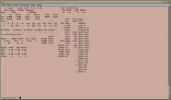Hi folks,
I wonder if somebody else has the same issues. I've upgraded my laptop from 13.2 to 13.3. Upgraded all the packages. Having the problem with rsync almost completely locking up the system with near-100% system load. Starting it up via nice (with the default increment of 10) doesn't help. The same script starting rsync ran absolutely fine on 13.2. Firefox now randomly does the same - 100% system load, the whole system becomes nearly unresponsive, X locking up. Can fix by switching to text console and killing the process. systat vmstat doesn't show anything unusual. Nothing in the system logs.
Any ideas where to even begin looking?
Update: Can reproduce the problem every time I start rsync. It takes 100% CPU (top shows 87% system, 12% idle) but X and everything else is locking up. Strangely enough, whenever I start rsync, firefox shows as consuming 200% WCPU in top at the same time. Once I kill the rsync task, X and firefox are automatically back to normal, so looks like rsync is the culprit here.
Also, Xfce's thunar is doing similar thing on start randomly - producing 100% CPU load, but X remains responsive, and top shows only 37% load when thunar starts. It eventually draws a window after some time, but when switching through folders it locks up randomly, sometimes producing gvfsd-recent at 100% CPU load and an error window "Failed to open recent:/// - Timeout was reached."
Randomly, also, similar behavior when starting a terminal window with zsh stuck at 100% load for a few seconds before showing prompt. Almost as if all related to disk activity.
Update 2 (edited): Ran fsck on the external drive I'm backing up to, now rsync runs fine, no lockup. After some time the rsync began to misbehave again (post #4 below).
I wonder if somebody else has the same issues. I've upgraded my laptop from 13.2 to 13.3. Upgraded all the packages. Having the problem with rsync almost completely locking up the system with near-100% system load. Starting it up via nice (with the default increment of 10) doesn't help. The same script starting rsync ran absolutely fine on 13.2. Firefox now randomly does the same - 100% system load, the whole system becomes nearly unresponsive, X locking up. Can fix by switching to text console and killing the process. systat vmstat doesn't show anything unusual. Nothing in the system logs.
Any ideas where to even begin looking?
Update: Can reproduce the problem every time I start rsync. It takes 100% CPU (top shows 87% system, 12% idle) but X and everything else is locking up. Strangely enough, whenever I start rsync, firefox shows as consuming 200% WCPU in top at the same time. Once I kill the rsync task, X and firefox are automatically back to normal, so looks like rsync is the culprit here.
Also, Xfce's thunar is doing similar thing on start randomly - producing 100% CPU load, but X remains responsive, and top shows only 37% load when thunar starts. It eventually draws a window after some time, but when switching through folders it locks up randomly, sometimes producing gvfsd-recent at 100% CPU load and an error window "Failed to open recent:/// - Timeout was reached."
Randomly, also, similar behavior when starting a terminal window with zsh stuck at 100% load for a few seconds before showing prompt. Almost as if all related to disk activity.
Update 2 (edited): Ran fsck on the external drive I'm backing up to, now rsync runs fine, no lockup. After some time the rsync began to misbehave again (post #4 below).




